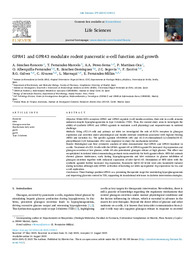Título :
GPR41 and GPR43 modulate rodent pancreatic α-cell function and growth |
Autor :
Sánchez-Roncero, A.
Fernández Marcelo, Tamara
Perez-Serna, Atenea Alexandra
Martínez Oca, Paula
Alberquilla-Fernández, Omaira
Sanchez-Dominguez, Rebeca
Segovia, José Carlos
Escrivá, Fernando
G. Galvez, Beatriz
Álvarez, Carmen
Marroqui Esclapez, Laura
Fernández-Millán, E. |
Editor :
Elsevier |
Departamento:
Departamentos de la UMH::Fisiología |
Fecha de publicación:
2025 |
URI :
https://hdl.handle.net/11000/38548 |
Resumen :
Objective
While SCFA receptors GPR41 and GPR43 regulate β-cell insulin secretion, their role in α-cells remains unknown despite hyperglucagonemia in type 2 diabetes (T2D). Thus, the current study aims to investigate the ability of synthetic GPR41 and GPR43 agonists to modulate α-cell physiology and responsiveness to nutrient challenge.
Methods
Using αTC1.9 cells and primary rat islets we investigated the role of SCFA receptors in glucagon expression and secretion under physiological and insulin resistant conditions associated with high-fat feeding (HFD) and lactation (L). The specific agonists AR420626 (AR) and (S)-2-(4-chlorophenyl)-3,3-dimethyl-N-(5-phenylthiazol-2-yl) butanamide (PA) were employed to study the mechanisms involved.
Results
Histological and flow cytometry analysis of islets demonstrated that GPR41 and GPR43 localized in α-cells. Treatment of αTC1.9 cells with the GPR41-agonist AR or GPR43-agonist PA increased Gcg expression and glucagon secretion at low glucose, while AR also potentiated glucagon release at high glucose. This effect was recapitulated in isolated islets demonstrating pertussis toxin sensitivity for both agonist effects. HFD-fed animals showed glucose intolerance, early fasting hyperglucagonemia and islet resistance to glucose inhibition of glucagon secretion together with enhanced expression of islet Gpr41/43. Stimulation of HFD islets with the synthetic agonists further increased Gcg expression. Pancreatic Gpr41/43 levels were also transiently induced during lactation although only GPR41 activation of lactating rat islets up-regulated Gcg expression via Gαi and α-cell replication.
Conclusions
These findings position GPR41 as a promising therapeutic target for modulating hyperglucagonemia and improving glycemic control in T2D, supporting its translational relevance in diabetes intervention strategies.
|
Palabras clave/Materias:
Islets
Glucagon secretion
Shorth-chain fatty acids
gpr41
gpr43
Type 2 diabetes |
Área de conocimiento :
CDU: Ciencias aplicadas: Medicina: Fisiología |
Tipo de documento :
info:eu-repo/semantics/article |
Derechos de acceso:
info:eu-repo/semantics/openAccess
Attribution-NonCommercial-NoDerivatives 4.0 Internacional |
DOI :
https://doi.org/10.1016/j.lfs.2025.123913 |
Publicado en:
Life Sciences |
Aparece en las colecciones:
Artículos Fisiología
|

 La licencia se describe como: Atribución-NonComercial-NoDerivada 4.0 Internacional.
La licencia se describe como: Atribución-NonComercial-NoDerivada 4.0 Internacional.
.png)